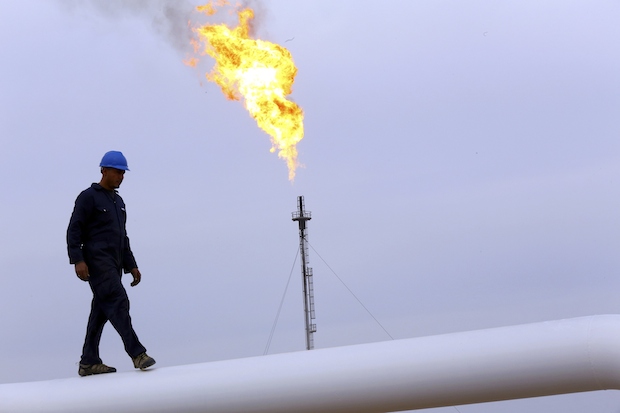As oil prices continue to fall, it is evident that a state of paranoia has afflicted Iran and Russia—two allies of the government of Bashar Al-Assad. Tehran and Moscow have issued similar statements in terms of their condemnation of plummeting oil prices, both claiming that this is the product of a conspiracy, rather than prevailing economic conditions.
On the Iranian side, President Hassan Rouhani said last week that the decline in oil prices was the result of a “political conspiracy,” emphasizing that the reasons for this are not purely economic. Similar remarks were also issued by Iranian First Vice-President Eshaq Jahangiri.
In Moscow, Russian Foreign Minister Sergey Lavrov said that there are grounds to believe that Washington is trying to destabilize the Russian regime through sanctions, even talking of attempts of regime change. Lavrov’s remarks came as the Russian rouble suffered a sharp price drop, prompting an emergency meeting at the Central Bank of Russia which took measures to try and protect its currency. For Russia, what makes things worse is Barack Obama’s intention to sign new legislation that would allow his administration to impose new sanctions on Moscow.
Meanwhile, US Secretary of State John Kerry hinted that his country may lift sanctions if Russia makes the right “choices,” adding that the Russian economy is in Vladimir Putin’s hands.
Well, what does all this mean politically? Interestingly, neither Iran nor Russia is now talking about the US seeking to topple the Assad regime. Rather, the talk now is about an international conspiracy against Iran and attempts at regime change in Russia, at least according to senior leadership figures in both countries.
Accordingly, we are facing a completely different scene in Iran and Russia. The two Assad allies, who have been providing him with money, weapons and fighters, are suffering economically from plummeting oil prices and are now worried of an international conspiracy against them. Therefore, the question that must be asked here is: To what extent will Iran and Russia continue to help and fund Assad?
How much longer can Tehran afford to finance its pointless adventures in the region? An example of Iran’s regional adventurism can be seen in its funding and support of the Houthis in Yemen, where Tehran thinks it can secure some quick and easy victories, contrary to the situation in Iraq and Syria.
As for Russia, the question is: Will it be able to continue to pursue its reckless policy in Ukraine and to fund Assad in Syria? After trying to protect the Syrian currency, Moscow is now scrambling to safeguard its very own.
Another question worth asking is: So long as President Obama is trying to pressure Russia by imposing new sanctions, why doesn’t he use similar measures against Iran, which has been sponsoring the state of instability in our region, from Iraq and Syria to Yemen and Lebanon?
